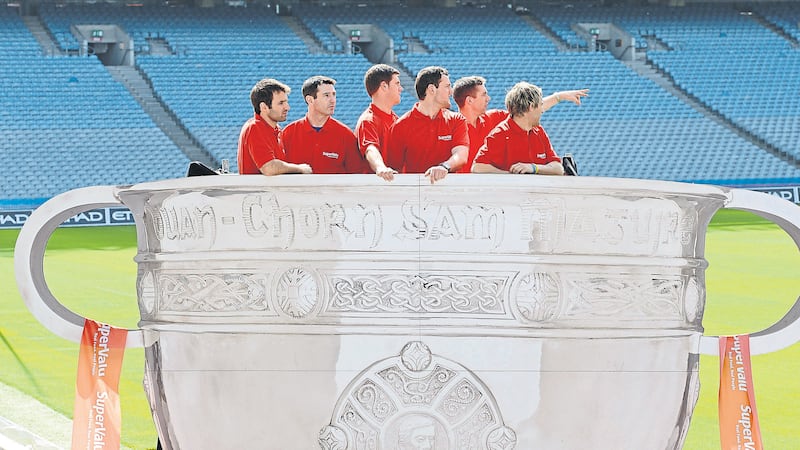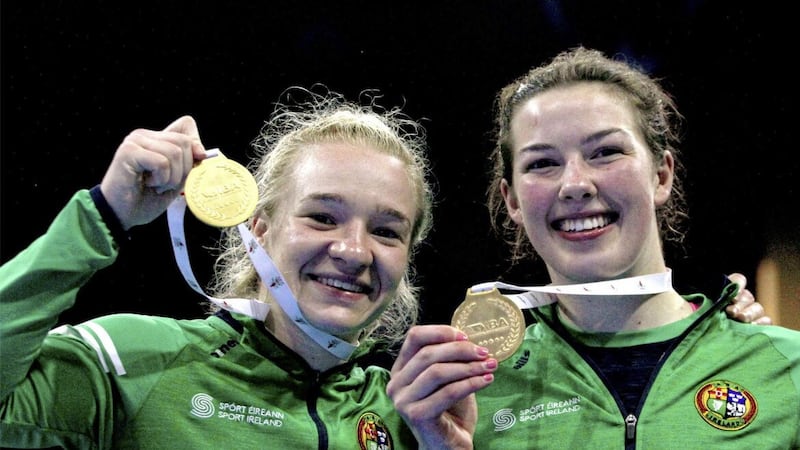THIS week’s column is a warning about the future and the increasingly controlled environment GAA journalists operate in.
Last week, I sent a text to Tony McEntee about the possibility of meeting for a one-to-one interview ahead of Mayo’s All-Ireland semi-final against Tipperary.
I’ve been acquainted with and interviewed Tony a number of times over the years, from his playing days to his successful managerial period with Crossmaglen Rangers.
Tony, now Mayo’s assistant manager, has always been media-friendly.
In fact, in a newspaper column, he articulated the importance of GAA players, managers and officials being more media-friendly and how it would serve to help the presentation of the Association.
“Have wheels, will travel,” was the gist of my interview pitch.
Tony replied explaining any interview requests had to go through Mayo’s team spokesperson.
I dutifully followed his instruction knowing full well there was zero chance of The Irish News interview request being met even, as I had promised Mayo’s spokesperson, Tony would see the final draft before publication.
Naturally, this kind of promise is frowned upon in our profession.
I was told two media gigs had been arranged and that The Irish News was very welcome to attend these to speak with manager Stephen Rochford and a couple of Mayo players.
Given the quick turnaround, the spokesperson continued, this would be the media’s only opportunity to gain access to the Mayo camp.
Dusting off my soapbox, I explained to the spokesperson that these media gigs were “generally demoralising, contrived affairs that don’t really serve GAA discourse well”.
A one-to-one interview was simply out of the question.
It’s certainly not Tony McEntee’s or the Mayo team spokesperson’s fault; it’s merely the prevailing culture of the day within the GAA rather than the fault of any individual.
After all, lots of GAA teams are conducting their affairs in similar ways.
The point of this column is not that a journalist’s one-to-one interview request was turned down.
Rather, its thrust is at odds with the path the GAA is currently travelling and wonders what kind of media the Association will have in, say, five years time.
What can really be gleaned from a player with a dozen or more recording devices thrust in his direction at a press night, apart from the familiar list of sound bites and well-worn clichés?
Such interviews don’t even scrape the surface. No back story can really be told.
And yet this is the dominant way media relations are conducted within the GAA.
What the reader gets is a diet of media-trained lines such as: ‘We won’t be under-estimating the opposition’ and the rest.
Worse still, the same player or manager quotes are mass-produced in the following day’s newspapers. Everybody gets the same.
Such ‘greenhouse’ media events get the results that the organisers desire.
The blandness kills the spirit of the journalist.
And if it kills the spirit of the journalist, one can only imagine how this plays out among the general GAA populace who take the time to read one anodyne interview after another.
The entire process and staged environment dulls the senses.
What’s happening as a result is that the players effectively forfeit centre stage and more space is occupied by opinion pieces written by journalists and ex-players.
Players are the centre-piece of the Association – but the way many of them are trained, packaged and presented to the reader does them and the sport a disservice.
As a rule, Republic of Ireland manager Martin O’Neill doesn’t grant one-to-one interviews to press reporters.
Any talking he has to do is done behind a table at a press conference. It has only limited value.
During the Euro 2016 finals in France he made one exception when he sat down with sports journalist Paul Kimmage for an in-depth, one-to-one interview.
It was the best thing O’Neill did. It was a brilliant, insightful interview in every sense.
Crucially, the reader got to know a little more about what makes the Kilrea man tick.
The best interviews are always those that take place outside the press gigs, or parallel to them.
In 2016, I sat down for one-to-one interviews with Shane McNaughton, James Daly and Gavin Devlin.
They are the three most fruitful interviews I’ve carried out this year.
Before he flew out to the Olympics in Rio, my colleague Neil Loughran travelled to Dublin to carry out separate interviews with former Olympic boxing champion Michael Carruth and highly-rated boxing coach Billy Walsh.
He didn’t need to go through a press officer. He rang them directly to set up the interviews.
He also sat down with Ruairi Dalton, a local boxer who recently turned professional, and produced a stunning piece of work.
Other recent arrivals to our sports team – Cahair O’Kane and Andy Watters – have raised the bar in similar fashion.
The Walsh, Carruth and Dalton interviews are a big part of what sports journalism is meant to be about.
Proper enquiry. Finding the essence of your interviewee and telling their back-story.
Sadly, this kind of enquiry and narrative is beyond the remit of most press gigs.
What we’re finding is more and more counties and teams are conducting their media affairs in this way.
It conjures the unflattering image of a reporter of dubious motivations trying to set a trap for the sitting health minister of the day, when what we’re talking about here is a field game.
Perspective has been lost along the way.
Lots of amateur footballers and hurlers are becoming beyond a sports journalist’s reach, although it must be noted there are still plenty of officials within the Association who appreciate the value of keeping access open to their managers and players.
The current prescription for media relations is having side effects.
It’s creating clones out of managers and players.
The hope is that the pursuit of real enquiry doesn’t become a thing of the past because if we’re not vigilant we’ll be dining out on a fast-food version of sports journalism before we realise.
And our appetite will suffer as a consequence.








